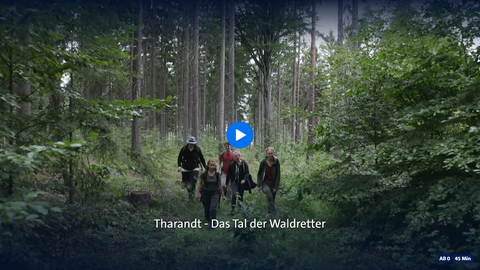Videos
Der Wald als CO2 Speicher
How much carbon is stored by forests? | "Short question" with Prof. Karsten Kalbitz © TU Dresden
Der Wald ist einer der wichtigsten Speicher von Kohlenstoff. In einem naturnahen Buchenwald in der Dübener Heide untersuchen Forstwissenschaftler:innen der TU Dresden, wie gut der Wald angesichts des Klimawandels und immer längerer Trockenperioden darin ist, Kohlenstoff und damit auch CO₂ zu binden. Für die Untersuchungen des Forschungsprojekts BENEATH wurden zahlreiche Messinstrumente an den Bäumen sowie im Waldboden installiert. In der »Kurzen Frage« erklärt Prof. Karsten Kalbitz vom Institut für Bodenkunde und Standortslehre, warum neben den Bäumen selbst auch der Boden ein bedeutender CO₂-Speicher ist, warum Totholz eine wichtige Rolle spielt und welche Auswirkungen die klimatischen Veränderungen haben.
Tharandt - Im Tal der Waldretter
Ein interessanter Beitrag aus der Reihe Der Osten - Entdecke wo du lebst des MDR zur aktuellen Forschung an der Fachrichtung Forstwissenschaften in Tharandt findet sich in der ARD Mediathek: Tharandt - im Tal der Waldretter.
Das Tal der Waldretter in Tharandt bei Dresden, gelegen an den Ufern der Wilden Weißeritz - hier hat sich eine der ältesten Forstschulen der Welt angesiedelt, schon die Kulisse ist wunderschön. Der Film erzählt von Menschen, die seit mehr als 200 Jahren hier das Wissen und die Kenntnisse über die Bäume und Wälder unseres Planeten speichern – und mehren.
Wird das Grundwasser knapp?
Eine Übernutzung des Grundwassers könnte gravierende Auswirkungen auf unsere Wasserversorgung haben. Prof. Andreas Hartmann untersucht am Institut für Grundwasserwirtschaft der TU Dresden, wann und wie viel Wasser zur Bildung von Grundwasser beiträgt. © TU Dresden
Bei »Auf Arbeit mit …« begleiten wir Prof. Andreas Hartmann an einem besonderen Tag: Statt am Computer Hochwassermodelle zu berechnen, geht es für ihn ins Feld. Im Erzgebirge steuern wir den Mäusebach, der eigentlich „Kleine Gimmlitz“ heißt, an. Dort haben er und sein Team hunderte Messpunkte installiert, die Daten zu Bodenfeuchte und Grundwasser aufzeichnen. Wie helfen die dort erhobenen Messdaten, Hochwasser vorherzusagen? Und wie wirkt sich der Klimawandel auf unser Grundwasser aus? Der Professor für Hydrowissenschaften verrät im Video, wie es aktuell und in Zukunft um die Ressource Wasser bestellt ist.
Stirbt der Wald?
Trockenheit, Waldbrände und der Borkenkäfer: In den letzten Jahren hört man immer häufiger, dass der Wald leidet. Wie steht es wirklich um den Wald? © TU Dresden
Kann KI helfen, Schädlinge wie den Borkenkäfer einzudämmen und trägt Literatur über Bäume zu einem größeren Verständnis über die Folgen des Klimawandels bei? Um diese Themen geht es in dieser Folge der »Guten Frage«. Dafür sprechen wir mit Wissenschaftler:innen der TU Dresden und insbesondere aus Tharandt, wo die Forstwissenschaftler:innen forschen und ausgebildet werden, über Jahresringforschung, Waldbrandprävention und Borkenkäferbekämpfung.
Schutz vor Hochwasser
Das Jahr 2021 war eines der regenreichsten seit langem. Die Folgen waren besonders beim verheerenden Hochwasser in Ahrweiler kaum zu übersehen. © TU Dresden
In der vierten Folge der »Guten Frage« beschäftigen wir uns damit, ob sich Hochwasser vorhersagen lassen, wie gut die Bevölkerung über Hochwasserrisiken informiert ist und warum zum Hochwasserschutz ganze Straßen angehoben werden müssen.
Wohin mit dem Müll?
Was passiert mit unserem Müll, nachdem wir ihn wegwerfen? Landet er in Recyclinganlagen, als Müllexport im Ausland oder gar in Form von Mikroplastik in den Ozeanen? © TU Dresden
In dieser »Guten Frage« dreht sich alles rund um das Thema Müll. Wie können wir ihn reduzieren? Vor welchen Herausforderungen stehen wir beim Recycling? Und warum entsteht beim Waschen Mikroplastik? Warum wir Abfall als Ressource verstehen sollten und warum Verpackungen vielleicht bald aus Algen hergestellt werden können, erfahrt ihr in diesem Video mit unserer neuen Moderatorin Lena.
Ist die Erde noch zu retten?
Sitzgelegenheit mit Umweltforscher:innen der TU Dresden © TU Dresden
In dieser Folge der »Sitzgelegenheit« dreht es sich um das Thema Klima und Umwelt. Dazu haben wir Expert:innen unterschiedlicher Bereiche der TU Dresden eingeladen. Können wir den Planeten noch retten? Welchen Beitrag dazu leisten moderne Technologien? Und was sagt man jemandem, der Nachhaltigkeit nicht wichtig findet? Ob sie sich bei den Antworten einig sind und was sie ganz persönlich jeden Tag für den Klima- und Umweltschutz tun, erfahrt ihr im Video.
Überhitzung, Überflutung, Überleben?
In der TUD Lecture befassen sich Dr. Valeri Goldberg und Dr. André Lindern mit dem globalen und regionalen Klimawandel und seinen Folgen, vor allem in Bezug auf Hitze und Dürre. © TU Dresden
In der TUD Lecture „Überhitzung, Überflutung, Überleben? - Wie viel „über“ hält unsere Gesellschaft aus?“ befassen sich Dr. Valeri Goldberg und Dr. André Lindern mit dem globalen und regionalen Klimawandel und seinen Folgen, vor allem in Bezug auf Hitze und Dürre. Moderiert wurde die Veranstaltung von der Hochschulgruppe "ÜberfluTUng – change TUD".
Welttag für die Bekämpfung von Dürre&Wüstenbildung
Niedriger Grundwasserspiegel, Waldbrände und Ernteeinbußen – Dürre bedroht auch Sachsen © TU Dresden
2018 war das wärmste und zweittrockenste Jahr seit 1881 – für Thomas Pluntke ein Warnsignal. Am heutigen Tag für die Bekämpfung der Dürre und Wüstenbildung erklärt der Dresdner Meteorologe, welche Auswirkungen anhaltende Trockenheit unter anderem auf die Vegetation sowie Land- und Forstwirtschaft hat.

